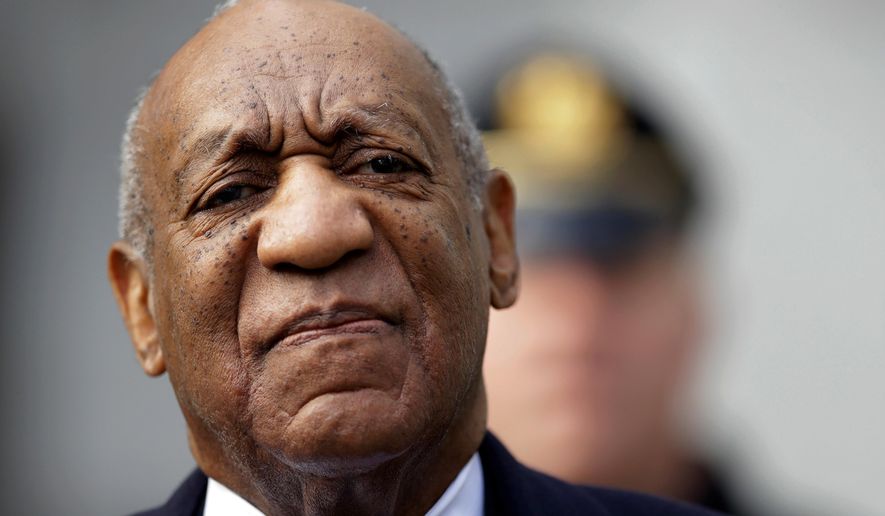NORRISTOWN, Pa. (AP) - In the tense moments before a jury convicted Bill Cosby of sexual assault, the prosecutor who had branded him a “con man” and called him out for laughing during closing arguments started to worry about the global implications if the #MeToo era’s first big trial went the other way.
Accuser Andrea Constand’s allegations that Cosby had drugged and molested her at his suburban Philadelphia mansion in 2004, revived out of nearly a decade of dormancy by another comedian’s viral joke, had coalesced into a movement of women who said he violated them, too.
Prosecutor Kristen Feden told The Associated Press she was “nervous for Andrea and for sex crime victims as a whole” at Cosby’s retrial.
“I felt like this verdict could dictate something more,” Feden said. “If they found him not guilty, I felt like they were feeding into every character assassination on sex crime victims.”
Feden and prosecutor Stewart Ryan spoke to the AP on Saturday about the nearly three-year journey from reopening the Cosby case to last Thursday’s verdict, how they restructured their approach after last year’s hung jury and the sacrifices they faced along the way.
Cosby, 80, is now a prisoner in his own home and faces the prospect of spending the rest of his life behind bars as he awaits sentencing within the next three months on three counts of aggravated indecent assault. He has maintained his innocence. His publicist has declared his conviction a “public lynching,” and his lawyers have vowed to appeal.
But Feden, Ryan and their boss, District Attorney Kevin Steele, said they are confident Cosby’s conviction will stand.
Prosecutors started thinking about a retrial as last year’s deliberations wore on for six days, Ryan said.
“We could kind of see the writing on the wall with the first jury,” he said.
Two days after Cosby’s conviction, law books and papers were still strewn on a long table in the war room where prosecutors plotted their strategy: leading off with an expert to educate the jury in victim behavior, successfully fighting to call five additional accusers and fending off the defense’s allegations that Constand was a scammer framing Cosby for a big payday.
The additional accusers allowed prosecutors to uncloak the man once revered as America’s Dad as a manipulative predator who used his built-in trust to trick women into taking powerful intoxicants so he could violate them. One woman pointedly called Cosby a “serial rapist,” and another asked him through her tears, “You remember, don’t you, Mr. Cosby?”
Feden said she felt “that needed to be exposed.”
“That was the most sickening part of this all,” she said. “When people in positions of power use that power to victimize people, I find that to be beyond disgusting.”
Then-District Attorney Risa Vetri Ferman reopened the Cosby investigation in July 2015 after a federal judge, acting on a request from the AP, unsealed portions of Cosby’s deposition testimony from a civil lawsuit he settled with Constand in 2006 for $3.4 million. In the testimony, which was read to jurors at both trials, he described giving quaaludes to women before sex in the 1970s and his encounters with Constand, a Temple University women’s basketball administrator.
Ryan likened Cosby’s description of a purported sexual encounter with Constand to “reading some disgusting pornography novel.” He said the testimony, far more explicit than what Cosby said in his lone police statement, showed “exactly what’s going on” in his mind.
Feden questioned Constand. Ryan cross-examined star defense witness Marguerite Jackson. Together they delivered a closing argument that wrested the “con artist” label from the defense and pushed back at suggestions the case was outside the statute of limitations.
Feden, a point guard in her basketball days, said she pivoted immediately when she saw Cosby out of the corner of her eye, smirking as she spoke about the similarities in Cosby’s conduct with Constand and the five other accusers.
“He’s laughing at the cost of these women? And then Andrea Constand’s in the courtroom? I’m furious,” Feden said. “No one in this courtroom is laughing. I understand that you’re a comedian, but this is not funny. This is not your stage. This is what you did wrong.”
Judge Steven O’Neill’s court crier called Ryan with the news that a verdict was in around lunchtime, about 14 hours after jurors started deliberating.
Ryan quickly relayed the news to Steele and Constand, who testified that she wanted justice. Then he called Feden, who had been so dedicated to seeing the case through that she worked out a deal to stay as a special prosecutor after leaving for the Philadelphia law firm Stradley Ronon.
Feden and Ryan spent months of long days working on the case away from their families: she, her husband and their two young sons; he, his wife and their 9-month-old son.
Ryan said the boy, born soon after the first trial, lifted him from hard days with a bright smile. Feden said she often thought of her late aunt, an OB-GYN, who had championed women and her career as a prosecutor.
Cosby’s case drew worldwide attention. The courtroom gallery was filled with reporters, and cameras lined the railings outside the courthouse. But to Feden and Ryan, the man known for playing Dr. Cliff Huxtable on “The Cosby Show” was just another predator whose victims were finally being heard.
“There was someone who had been sexually assaulted, someone who deserved to hear 12 people say that not only do we believe you but we’re going to hold the person who did it accountable,” Ryan said.
The Associated Press does not typically identify people who say they are victims of sexual assault unless they grant permission, as Constand has done.
___
Follow Mike Sisak at https://twitter.com/mikesisak
___
For more coverage visit https://www.apnews.com/tag/CosbyonTrial
___
This story has been corrected to show the prosecutors spoke on Saturday, not Sunday.




Please read our comment policy before commenting.